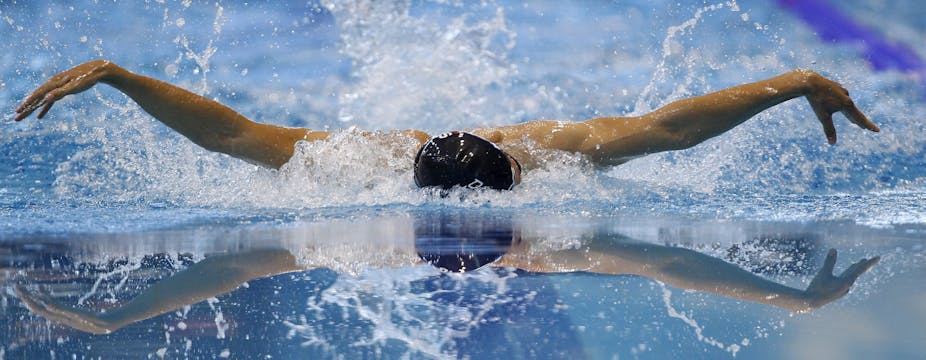The knives are well and truly out. With no gold medals coming from champion Australian swimmers James Magnussen, Stephanie Rice, Leisel Jones, Jessicah Schipper and a handful of relay teams at the London Olympics, Swimming Australia has announced an independent review of Australian swimming.
This isn’t a first in regard to major championships. Swimming Australia conducts reviews of all major events, including the Olympics, but Swimming Australia President David Urquhart noted that this one will be more comprehensive and detailed.
Did he say that to release some of the pressure placed upon the Australian team because of the “disappointing” results in the pool? Or is there genuine concern that things have gone dramatically off the rails and that the lack of gold medal success could have been prevented?
In an earlier blog post on The Conversation I noted the need for a reality check about the so-called “disappointing” Australian Olympic performance. Australia currently remains a top-ten medal-winning nation with the only “issue” being the lack of gold medals. Interestingly, ten of Australia’s current haul of 25 medals came from the pool – surely that cannot be considered a poor performance.
Another very real and valid excuse for missing out on a few gold medals is the fact the rest of the world is catching up with Australia. A global research project conducted by the Institute of Sport, Exercise and Active Living (ISEAL) here at Victoria University and the Australian Sports Commission has shown numerous countries (including the UK) are significantly increasing their financial investment in high-performance sport systems.
The SPLISS project (sport policy factors leading to international sporting success) has looked into a range of critical success factors in 16 countries’ sport policies that may explain why certain nations are more successful than others.
Although Australia’s investment in elite sport has continued to grow, other countries, such as South Korea, Japan, France and Brazil, have dramatically increased their focus on and investment in high-performance preparation. Many countries have also started prioritising investments in sports such as swimming where there are many medals to win – an attempt to optimise their return-on-investment ratios.
Put succinctly, international competition is getting more intense. Combine this with the fact Australia has a talent pool of 22 million to tap into, compared with almost 50 million in South Korea, 128 million in Japan, 66 million in France and 200 million in Brazil. Such numbers give you an idea of what we’re up against.
Success also breeds success … for others that is. For quite a while, but particularly since the Sydney Games, Australian sport administrators, sport scientists, event managers, and high-performance coaching staff have been lured to all corners of the world to help others improve their performance.
Many of Australia’s top coaches, but also numerous unknown and unnamed sport scientists are working “for the competition” and are probably responsible for several Australian defeats during the past two weeks.
Here at ISEAL we have a French sport scientist working with our track cycling team (David Rouffet), and an Israeli sport scientist working on identifying the genetic predictors of elite sport talent (Nir Eynon).
I’m a born and bred Dutchie, still longing for the mighty orange to become soccer world champions one day, but cheering for Australia on most occasions. Our new AIS Director worked for the British Institute of Sport before he was brought back to Australia earlier this year – too late to have a measurable impact on these Games.
By the way, this is a perfectly normal practice in any type of business – the best performers will be recruited by the most ambitious and entrepreneurial companies.
The simple solution to this problem for Australian sport is to convince the federal government or some good-old Aussie-owned companies that more resources are required to keep the Australian talent home … and to recruit some of the best overseas talent to come and work in Australia.
In 1937 Dutch journalist and historian Jan Romein coined the term “the law of the handicap of a head start”. The idea is simple: those who lead the way initially (such as Australia through its Australian Institute of Sport that was set up in the early 1980s) may suffer from the lack of competitive pressure to continue to improve.
In other words, those who are leaders are aspirational targets for those who emulate in order to become leaders. Leaders may too long trust their ability to win, before followers have improved and innovated beyond the relied-upon capacity of the leaders.
Some 30 years of Australian Institute of Sport strength may have come to the point in time where the initial benefit of leading is turning into a weakness. That is, we might not be sufficiently able to change with the times and innovate in order to stay on top.
If this is the main reason for Australia’s declining gold medal success – and I’m not saying it is - then the move of Swimming Australia to comprehensively review its Olympic campaign may well be prescient and leading the way for other sports to follow.

